Managing Business Records: VRQA Organizational Recordkeeping Analysis
VerifiedAdded on 2020/04/21
|24
|4948
|119
Report
AI Summary
This report provides a comprehensive organizational recordkeeping analysis of the Victorian Registration and Qualification Authority (VRQA). It begins with an overview of the organization's mission, core business, structure, and core functions. The report then delves into the regulatory environment, accountability framework, and archival practices of the VRQA, including its relationship with regulatory organizations. Stakeholders are identified, and their accountability issues are discussed, followed by an examination of the organization's culture and associated accountability. A key focus is the risk associated with recordkeeping. Finally, the report offers detailed recommendations for recordkeeping system requirements, encompassing a recordkeeping framework, record preservation and archiving strategies, recordkeeping tools, technology integration, and ongoing monitoring and evaluation. The report aims to identify challenges and propose solutions for effective record management within the VRQA.
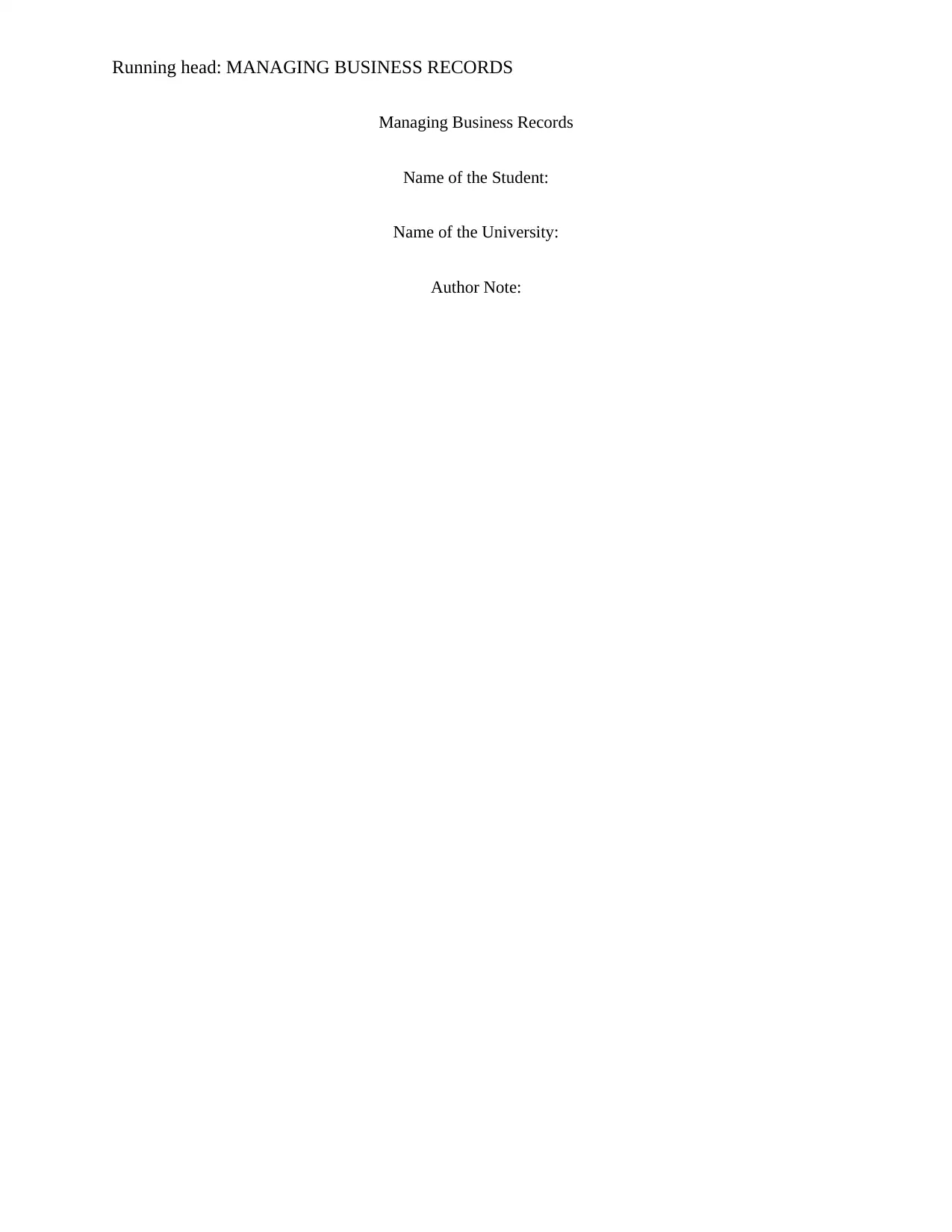
Running head: MANAGING BUSINESS RECORDS
Managing Business Records
Name of the Student:
Name of the University:
Author Note:
Managing Business Records
Name of the Student:
Name of the University:
Author Note:
Paraphrase This Document
Need a fresh take? Get an instant paraphrase of this document with our AI Paraphraser
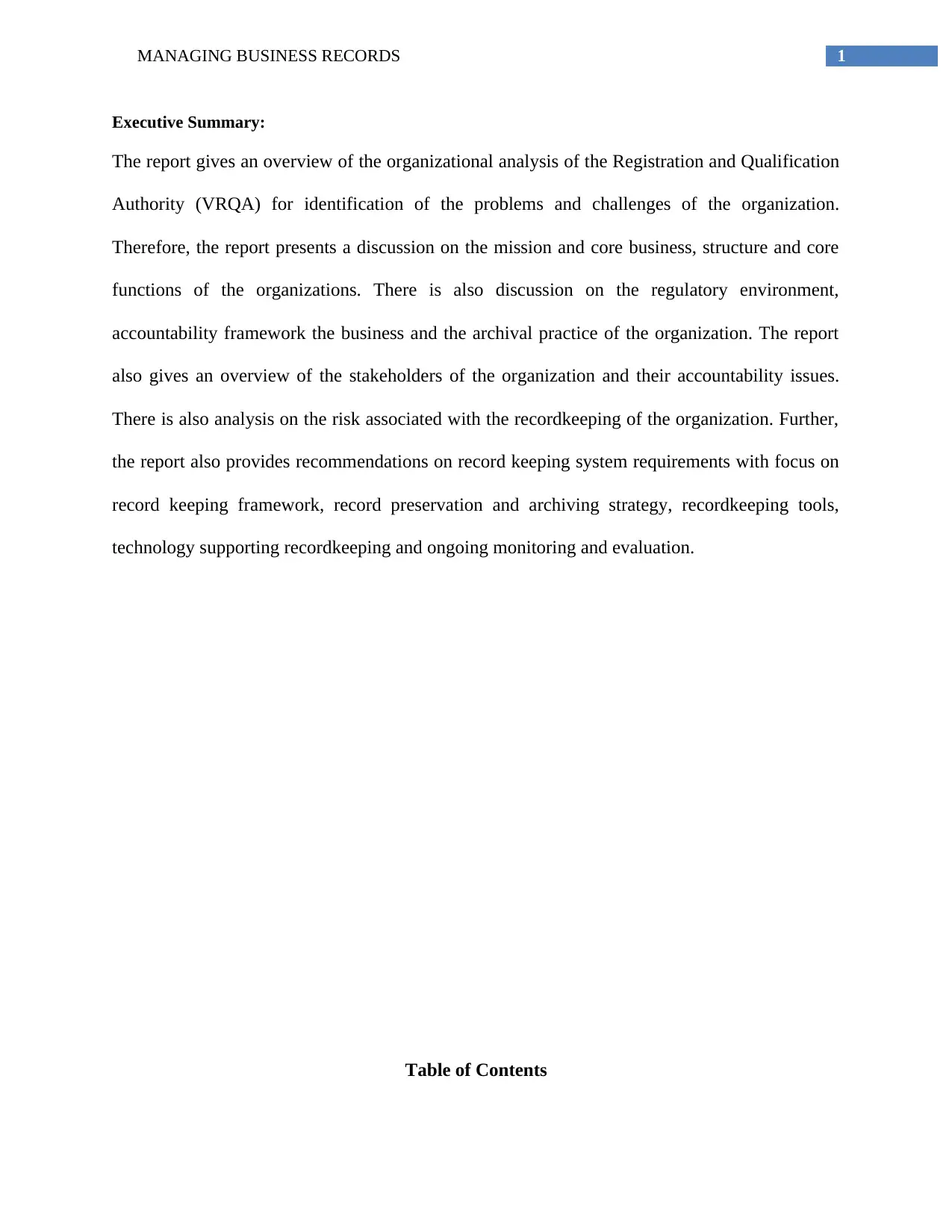
1MANAGING BUSINESS RECORDS
Executive Summary:
The report gives an overview of the organizational analysis of the Registration and Qualification
Authority (VRQA) for identification of the problems and challenges of the organization.
Therefore, the report presents a discussion on the mission and core business, structure and core
functions of the organizations. There is also discussion on the regulatory environment,
accountability framework the business and the archival practice of the organization. The report
also gives an overview of the stakeholders of the organization and their accountability issues.
There is also analysis on the risk associated with the recordkeeping of the organization. Further,
the report also provides recommendations on record keeping system requirements with focus on
record keeping framework, record preservation and archiving strategy, recordkeeping tools,
technology supporting recordkeeping and ongoing monitoring and evaluation.
Table of Contents
Executive Summary:
The report gives an overview of the organizational analysis of the Registration and Qualification
Authority (VRQA) for identification of the problems and challenges of the organization.
Therefore, the report presents a discussion on the mission and core business, structure and core
functions of the organizations. There is also discussion on the regulatory environment,
accountability framework the business and the archival practice of the organization. The report
also gives an overview of the stakeholders of the organization and their accountability issues.
There is also analysis on the risk associated with the recordkeeping of the organization. Further,
the report also provides recommendations on record keeping system requirements with focus on
record keeping framework, record preservation and archiving strategy, recordkeeping tools,
technology supporting recordkeeping and ongoing monitoring and evaluation.
Table of Contents
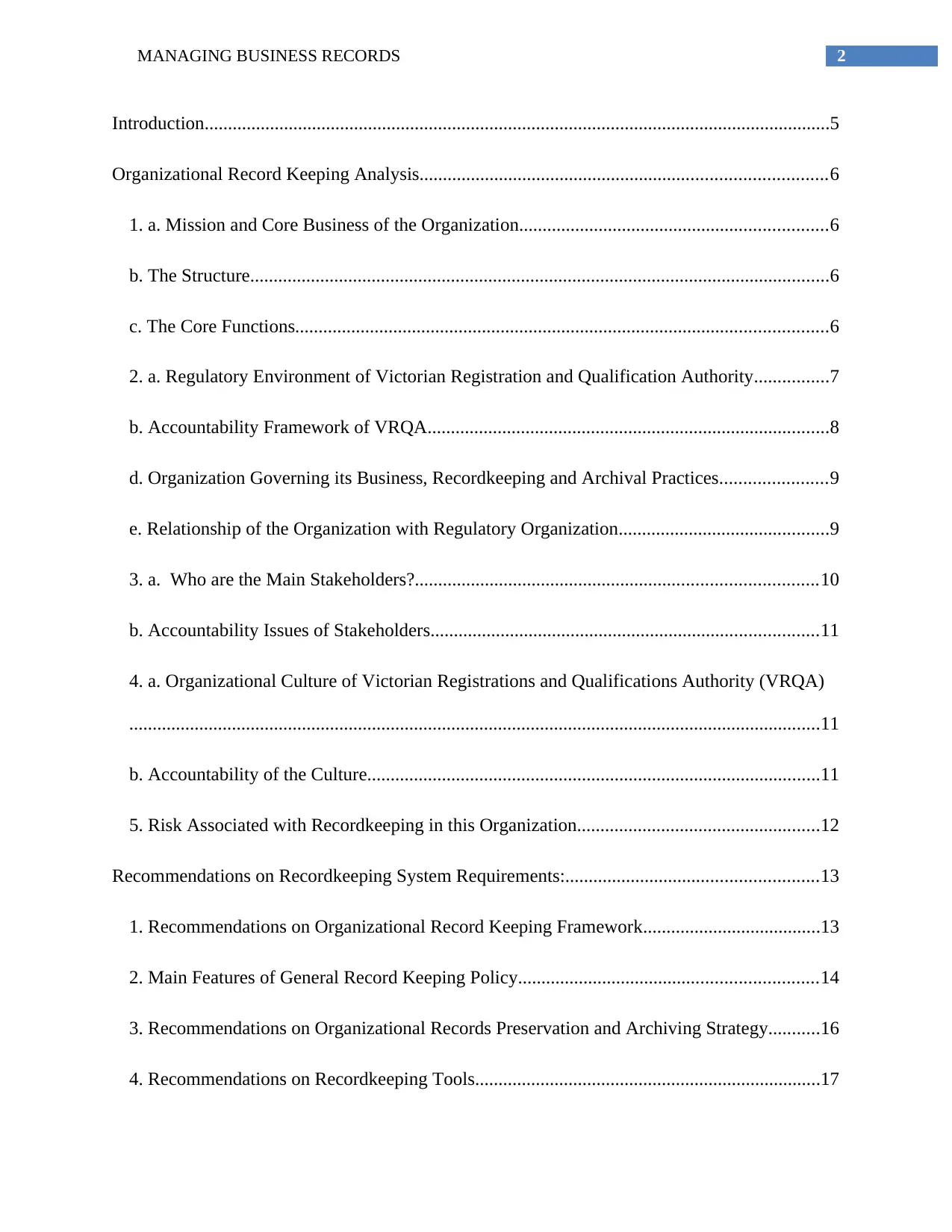
2MANAGING BUSINESS RECORDS
Introduction......................................................................................................................................5
Organizational Record Keeping Analysis.......................................................................................6
1. a. Mission and Core Business of the Organization..................................................................6
b. The Structure............................................................................................................................6
c. The Core Functions..................................................................................................................6
2. a. Regulatory Environment of Victorian Registration and Qualification Authority................7
b. Accountability Framework of VRQA......................................................................................8
d. Organization Governing its Business, Recordkeeping and Archival Practices.......................9
e. Relationship of the Organization with Regulatory Organization.............................................9
3. a. Who are the Main Stakeholders?......................................................................................10
b. Accountability Issues of Stakeholders...................................................................................11
4. a. Organizational Culture of Victorian Registrations and Qualifications Authority (VRQA)
....................................................................................................................................................11
b. Accountability of the Culture.................................................................................................11
5. Risk Associated with Recordkeeping in this Organization....................................................12
Recommendations on Recordkeeping System Requirements:......................................................13
1. Recommendations on Organizational Record Keeping Framework......................................13
2. Main Features of General Record Keeping Policy................................................................14
3. Recommendations on Organizational Records Preservation and Archiving Strategy...........16
4. Recommendations on Recordkeeping Tools..........................................................................17
Introduction......................................................................................................................................5
Organizational Record Keeping Analysis.......................................................................................6
1. a. Mission and Core Business of the Organization..................................................................6
b. The Structure............................................................................................................................6
c. The Core Functions..................................................................................................................6
2. a. Regulatory Environment of Victorian Registration and Qualification Authority................7
b. Accountability Framework of VRQA......................................................................................8
d. Organization Governing its Business, Recordkeeping and Archival Practices.......................9
e. Relationship of the Organization with Regulatory Organization.............................................9
3. a. Who are the Main Stakeholders?......................................................................................10
b. Accountability Issues of Stakeholders...................................................................................11
4. a. Organizational Culture of Victorian Registrations and Qualifications Authority (VRQA)
....................................................................................................................................................11
b. Accountability of the Culture.................................................................................................11
5. Risk Associated with Recordkeeping in this Organization....................................................12
Recommendations on Recordkeeping System Requirements:......................................................13
1. Recommendations on Organizational Record Keeping Framework......................................13
2. Main Features of General Record Keeping Policy................................................................14
3. Recommendations on Organizational Records Preservation and Archiving Strategy...........16
4. Recommendations on Recordkeeping Tools..........................................................................17
⊘ This is a preview!⊘
Do you want full access?
Subscribe today to unlock all pages.

Trusted by 1+ million students worldwide
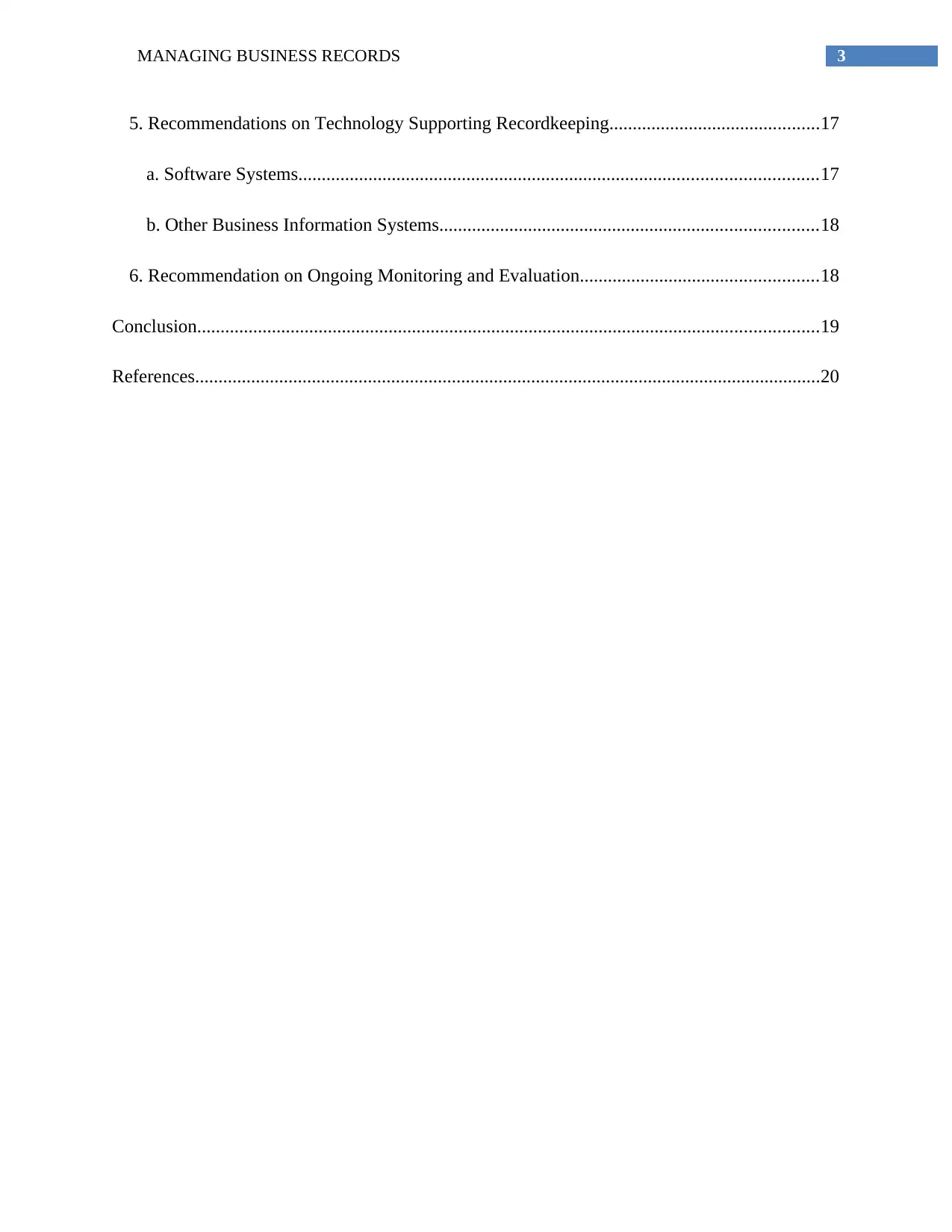
3MANAGING BUSINESS RECORDS
5. Recommendations on Technology Supporting Recordkeeping.............................................17
a. Software Systems...............................................................................................................17
b. Other Business Information Systems.................................................................................18
6. Recommendation on Ongoing Monitoring and Evaluation...................................................18
Conclusion.....................................................................................................................................19
References......................................................................................................................................20
5. Recommendations on Technology Supporting Recordkeeping.............................................17
a. Software Systems...............................................................................................................17
b. Other Business Information Systems.................................................................................18
6. Recommendation on Ongoing Monitoring and Evaluation...................................................18
Conclusion.....................................................................................................................................19
References......................................................................................................................................20
Paraphrase This Document
Need a fresh take? Get an instant paraphrase of this document with our AI Paraphraser

4MANAGING BUSINESS RECORDS
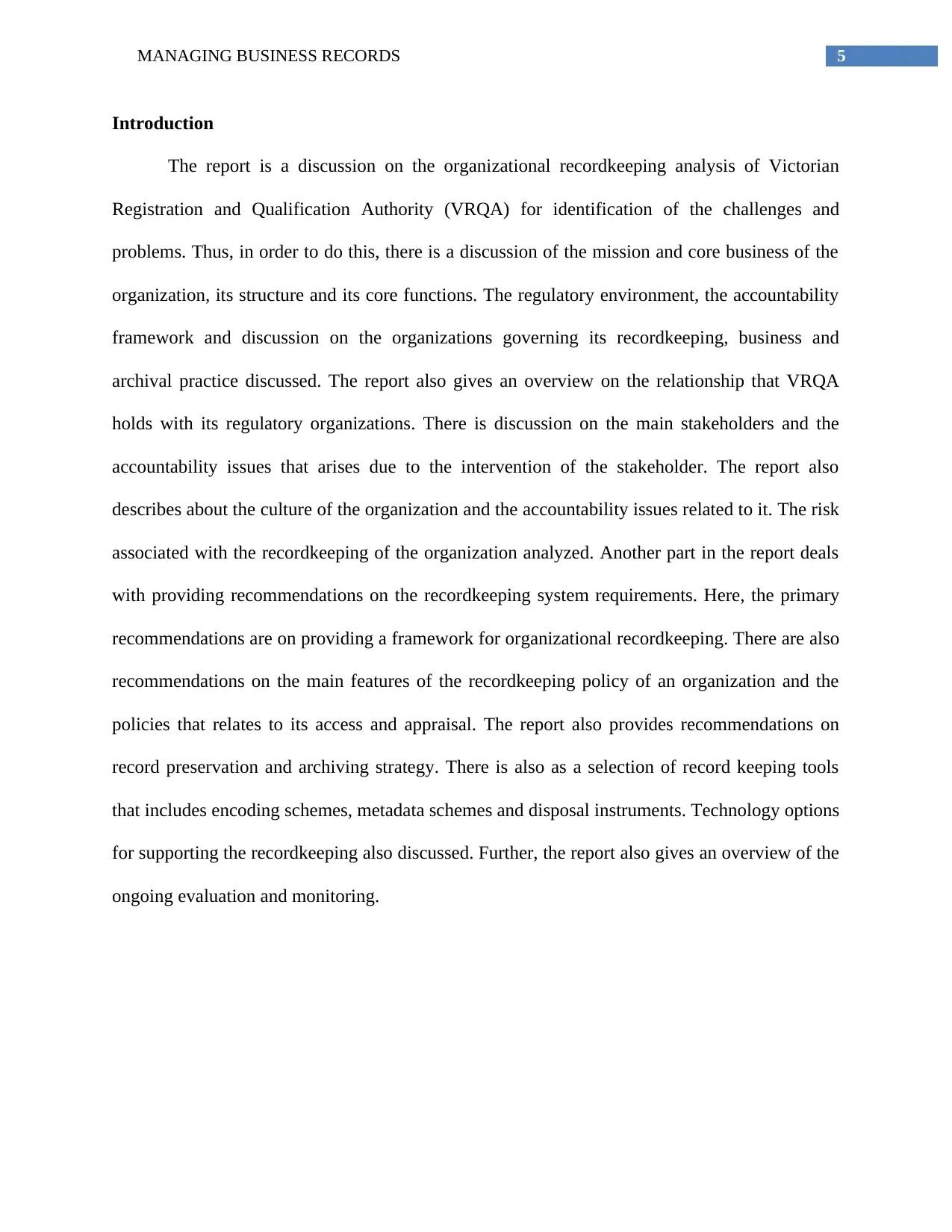
5MANAGING BUSINESS RECORDS
Introduction
The report is a discussion on the organizational recordkeeping analysis of Victorian
Registration and Qualification Authority (VRQA) for identification of the challenges and
problems. Thus, in order to do this, there is a discussion of the mission and core business of the
organization, its structure and its core functions. The regulatory environment, the accountability
framework and discussion on the organizations governing its recordkeeping, business and
archival practice discussed. The report also gives an overview on the relationship that VRQA
holds with its regulatory organizations. There is discussion on the main stakeholders and the
accountability issues that arises due to the intervention of the stakeholder. The report also
describes about the culture of the organization and the accountability issues related to it. The risk
associated with the recordkeeping of the organization analyzed. Another part in the report deals
with providing recommendations on the recordkeeping system requirements. Here, the primary
recommendations are on providing a framework for organizational recordkeeping. There are also
recommendations on the main features of the recordkeeping policy of an organization and the
policies that relates to its access and appraisal. The report also provides recommendations on
record preservation and archiving strategy. There is also as a selection of record keeping tools
that includes encoding schemes, metadata schemes and disposal instruments. Technology options
for supporting the recordkeeping also discussed. Further, the report also gives an overview of the
ongoing evaluation and monitoring.
Introduction
The report is a discussion on the organizational recordkeeping analysis of Victorian
Registration and Qualification Authority (VRQA) for identification of the challenges and
problems. Thus, in order to do this, there is a discussion of the mission and core business of the
organization, its structure and its core functions. The regulatory environment, the accountability
framework and discussion on the organizations governing its recordkeeping, business and
archival practice discussed. The report also gives an overview on the relationship that VRQA
holds with its regulatory organizations. There is discussion on the main stakeholders and the
accountability issues that arises due to the intervention of the stakeholder. The report also
describes about the culture of the organization and the accountability issues related to it. The risk
associated with the recordkeeping of the organization analyzed. Another part in the report deals
with providing recommendations on the recordkeeping system requirements. Here, the primary
recommendations are on providing a framework for organizational recordkeeping. There are also
recommendations on the main features of the recordkeeping policy of an organization and the
policies that relates to its access and appraisal. The report also provides recommendations on
record preservation and archiving strategy. There is also as a selection of record keeping tools
that includes encoding schemes, metadata schemes and disposal instruments. Technology options
for supporting the recordkeeping also discussed. Further, the report also gives an overview of the
ongoing evaluation and monitoring.
⊘ This is a preview!⊘
Do you want full access?
Subscribe today to unlock all pages.

Trusted by 1+ million students worldwide
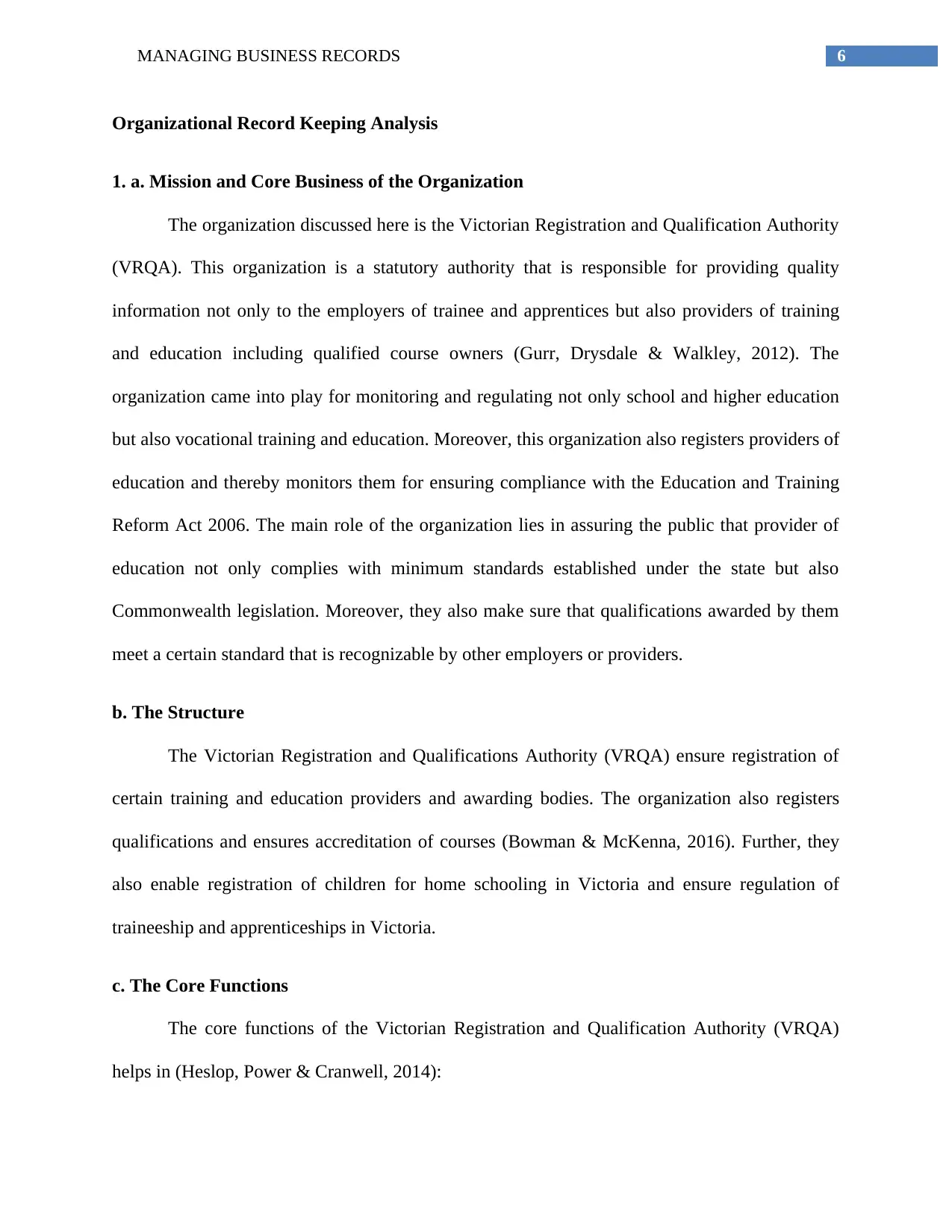
6MANAGING BUSINESS RECORDS
Organizational Record Keeping Analysis
1. a. Mission and Core Business of the Organization
The organization discussed here is the Victorian Registration and Qualification Authority
(VRQA). This organization is a statutory authority that is responsible for providing quality
information not only to the employers of trainee and apprentices but also providers of training
and education including qualified course owners (Gurr, Drysdale & Walkley, 2012). The
organization came into play for monitoring and regulating not only school and higher education
but also vocational training and education. Moreover, this organization also registers providers of
education and thereby monitors them for ensuring compliance with the Education and Training
Reform Act 2006. The main role of the organization lies in assuring the public that provider of
education not only complies with minimum standards established under the state but also
Commonwealth legislation. Moreover, they also make sure that qualifications awarded by them
meet a certain standard that is recognizable by other employers or providers.
b. The Structure
The Victorian Registration and Qualifications Authority (VRQA) ensure registration of
certain training and education providers and awarding bodies. The organization also registers
qualifications and ensures accreditation of courses (Bowman & McKenna, 2016). Further, they
also enable registration of children for home schooling in Victoria and ensure regulation of
traineeship and apprenticeships in Victoria.
c. The Core Functions
The core functions of the Victorian Registration and Qualification Authority (VRQA)
helps in (Heslop, Power & Cranwell, 2014):
Organizational Record Keeping Analysis
1. a. Mission and Core Business of the Organization
The organization discussed here is the Victorian Registration and Qualification Authority
(VRQA). This organization is a statutory authority that is responsible for providing quality
information not only to the employers of trainee and apprentices but also providers of training
and education including qualified course owners (Gurr, Drysdale & Walkley, 2012). The
organization came into play for monitoring and regulating not only school and higher education
but also vocational training and education. Moreover, this organization also registers providers of
education and thereby monitors them for ensuring compliance with the Education and Training
Reform Act 2006. The main role of the organization lies in assuring the public that provider of
education not only complies with minimum standards established under the state but also
Commonwealth legislation. Moreover, they also make sure that qualifications awarded by them
meet a certain standard that is recognizable by other employers or providers.
b. The Structure
The Victorian Registration and Qualifications Authority (VRQA) ensure registration of
certain training and education providers and awarding bodies. The organization also registers
qualifications and ensures accreditation of courses (Bowman & McKenna, 2016). Further, they
also enable registration of children for home schooling in Victoria and ensure regulation of
traineeship and apprenticeships in Victoria.
c. The Core Functions
The core functions of the Victorian Registration and Qualification Authority (VRQA)
helps in (Heslop, Power & Cranwell, 2014):
Paraphrase This Document
Need a fresh take? Get an instant paraphrase of this document with our AI Paraphraser
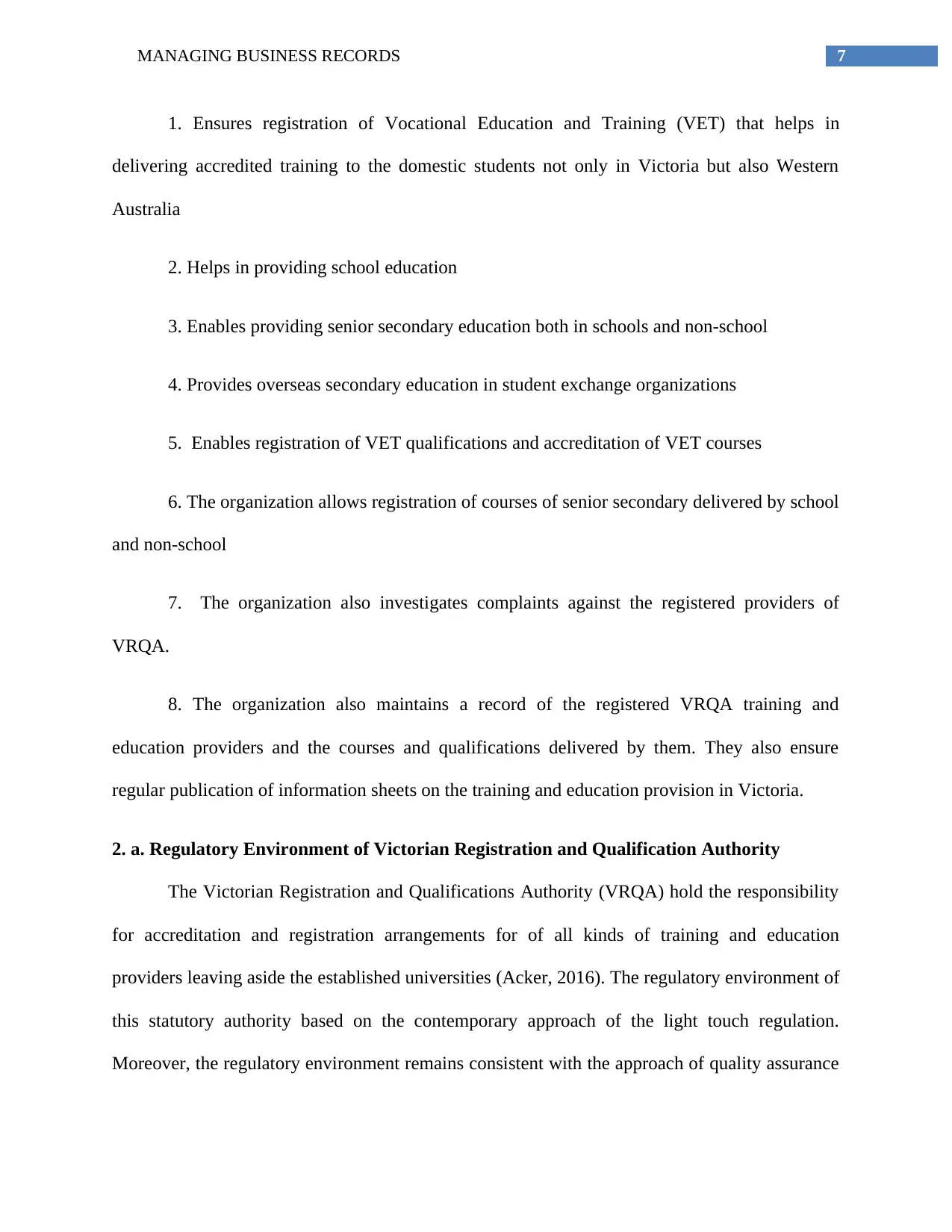
7MANAGING BUSINESS RECORDS
1. Ensures registration of Vocational Education and Training (VET) that helps in
delivering accredited training to the domestic students not only in Victoria but also Western
Australia
2. Helps in providing school education
3. Enables providing senior secondary education both in schools and non-school
4. Provides overseas secondary education in student exchange organizations
5. Enables registration of VET qualifications and accreditation of VET courses
6. The organization allows registration of courses of senior secondary delivered by school
and non-school
7. The organization also investigates complaints against the registered providers of
VRQA.
8. The organization also maintains a record of the registered VRQA training and
education providers and the courses and qualifications delivered by them. They also ensure
regular publication of information sheets on the training and education provision in Victoria.
2. a. Regulatory Environment of Victorian Registration and Qualification Authority
The Victorian Registration and Qualifications Authority (VRQA) hold the responsibility
for accreditation and registration arrangements for of all kinds of training and education
providers leaving aside the established universities (Acker, 2016). The regulatory environment of
this statutory authority based on the contemporary approach of the light touch regulation.
Moreover, the regulatory environment remains consistent with the approach of quality assurance
1. Ensures registration of Vocational Education and Training (VET) that helps in
delivering accredited training to the domestic students not only in Victoria but also Western
Australia
2. Helps in providing school education
3. Enables providing senior secondary education both in schools and non-school
4. Provides overseas secondary education in student exchange organizations
5. Enables registration of VET qualifications and accreditation of VET courses
6. The organization allows registration of courses of senior secondary delivered by school
and non-school
7. The organization also investigates complaints against the registered providers of
VRQA.
8. The organization also maintains a record of the registered VRQA training and
education providers and the courses and qualifications delivered by them. They also ensure
regular publication of information sheets on the training and education provision in Victoria.
2. a. Regulatory Environment of Victorian Registration and Qualification Authority
The Victorian Registration and Qualifications Authority (VRQA) hold the responsibility
for accreditation and registration arrangements for of all kinds of training and education
providers leaving aside the established universities (Acker, 2016). The regulatory environment of
this statutory authority based on the contemporary approach of the light touch regulation.
Moreover, the regulatory environment remains consistent with the approach of quality assurance
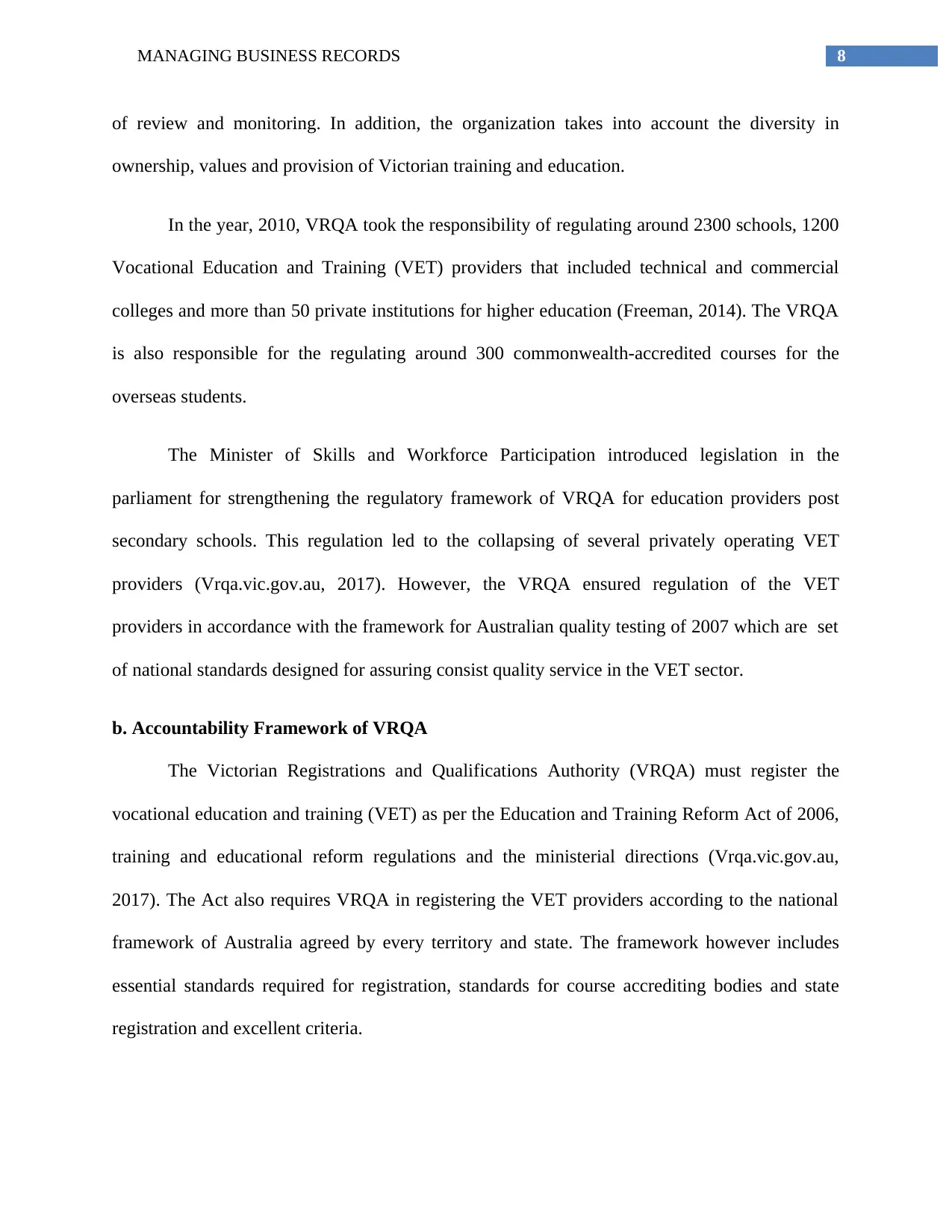
8MANAGING BUSINESS RECORDS
of review and monitoring. In addition, the organization takes into account the diversity in
ownership, values and provision of Victorian training and education.
In the year, 2010, VRQA took the responsibility of regulating around 2300 schools, 1200
Vocational Education and Training (VET) providers that included technical and commercial
colleges and more than 50 private institutions for higher education (Freeman, 2014). The VRQA
is also responsible for the regulating around 300 commonwealth-accredited courses for the
overseas students.
The Minister of Skills and Workforce Participation introduced legislation in the
parliament for strengthening the regulatory framework of VRQA for education providers post
secondary schools. This regulation led to the collapsing of several privately operating VET
providers (Vrqa.vic.gov.au, 2017). However, the VRQA ensured regulation of the VET
providers in accordance with the framework for Australian quality testing of 2007 which are set
of national standards designed for assuring consist quality service in the VET sector.
b. Accountability Framework of VRQA
The Victorian Registrations and Qualifications Authority (VRQA) must register the
vocational education and training (VET) as per the Education and Training Reform Act of 2006,
training and educational reform regulations and the ministerial directions (Vrqa.vic.gov.au,
2017). The Act also requires VRQA in registering the VET providers according to the national
framework of Australia agreed by every territory and state. The framework however includes
essential standards required for registration, standards for course accrediting bodies and state
registration and excellent criteria.
of review and monitoring. In addition, the organization takes into account the diversity in
ownership, values and provision of Victorian training and education.
In the year, 2010, VRQA took the responsibility of regulating around 2300 schools, 1200
Vocational Education and Training (VET) providers that included technical and commercial
colleges and more than 50 private institutions for higher education (Freeman, 2014). The VRQA
is also responsible for the regulating around 300 commonwealth-accredited courses for the
overseas students.
The Minister of Skills and Workforce Participation introduced legislation in the
parliament for strengthening the regulatory framework of VRQA for education providers post
secondary schools. This regulation led to the collapsing of several privately operating VET
providers (Vrqa.vic.gov.au, 2017). However, the VRQA ensured regulation of the VET
providers in accordance with the framework for Australian quality testing of 2007 which are set
of national standards designed for assuring consist quality service in the VET sector.
b. Accountability Framework of VRQA
The Victorian Registrations and Qualifications Authority (VRQA) must register the
vocational education and training (VET) as per the Education and Training Reform Act of 2006,
training and educational reform regulations and the ministerial directions (Vrqa.vic.gov.au,
2017). The Act also requires VRQA in registering the VET providers according to the national
framework of Australia agreed by every territory and state. The framework however includes
essential standards required for registration, standards for course accrediting bodies and state
registration and excellent criteria.
⊘ This is a preview!⊘
Do you want full access?
Subscribe today to unlock all pages.

Trusted by 1+ million students worldwide
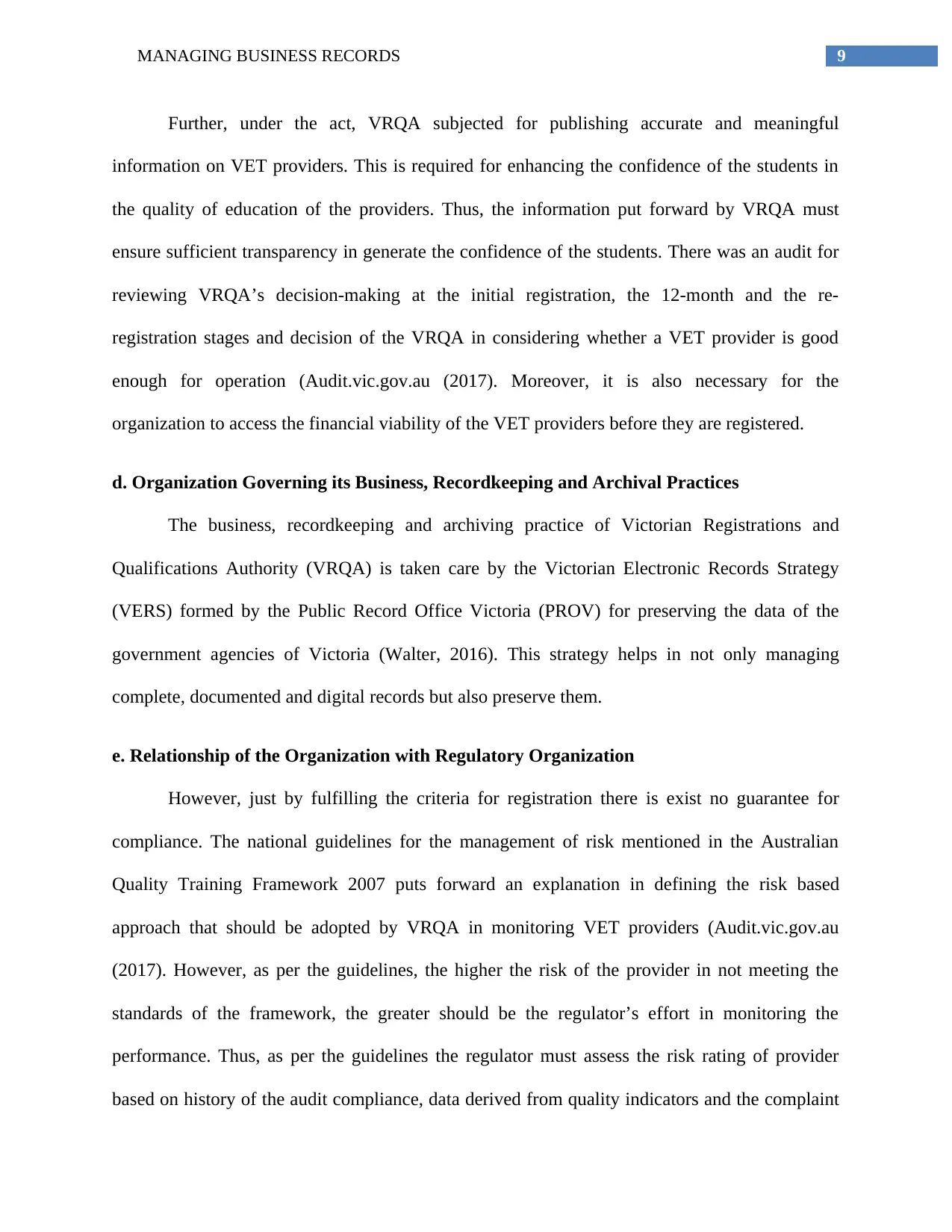
9MANAGING BUSINESS RECORDS
Further, under the act, VRQA subjected for publishing accurate and meaningful
information on VET providers. This is required for enhancing the confidence of the students in
the quality of education of the providers. Thus, the information put forward by VRQA must
ensure sufficient transparency in generate the confidence of the students. There was an audit for
reviewing VRQA’s decision-making at the initial registration, the 12-month and the re-
registration stages and decision of the VRQA in considering whether a VET provider is good
enough for operation (Audit.vic.gov.au (2017). Moreover, it is also necessary for the
organization to access the financial viability of the VET providers before they are registered.
d. Organization Governing its Business, Recordkeeping and Archival Practices
The business, recordkeeping and archiving practice of Victorian Registrations and
Qualifications Authority (VRQA) is taken care by the Victorian Electronic Records Strategy
(VERS) formed by the Public Record Office Victoria (PROV) for preserving the data of the
government agencies of Victoria (Walter, 2016). This strategy helps in not only managing
complete, documented and digital records but also preserve them.
e. Relationship of the Organization with Regulatory Organization
However, just by fulfilling the criteria for registration there is exist no guarantee for
compliance. The national guidelines for the management of risk mentioned in the Australian
Quality Training Framework 2007 puts forward an explanation in defining the risk based
approach that should be adopted by VRQA in monitoring VET providers (Audit.vic.gov.au
(2017). However, as per the guidelines, the higher the risk of the provider in not meeting the
standards of the framework, the greater should be the regulator’s effort in monitoring the
performance. Thus, as per the guidelines the regulator must assess the risk rating of provider
based on history of the audit compliance, data derived from quality indicators and the complaint
Further, under the act, VRQA subjected for publishing accurate and meaningful
information on VET providers. This is required for enhancing the confidence of the students in
the quality of education of the providers. Thus, the information put forward by VRQA must
ensure sufficient transparency in generate the confidence of the students. There was an audit for
reviewing VRQA’s decision-making at the initial registration, the 12-month and the re-
registration stages and decision of the VRQA in considering whether a VET provider is good
enough for operation (Audit.vic.gov.au (2017). Moreover, it is also necessary for the
organization to access the financial viability of the VET providers before they are registered.
d. Organization Governing its Business, Recordkeeping and Archival Practices
The business, recordkeeping and archiving practice of Victorian Registrations and
Qualifications Authority (VRQA) is taken care by the Victorian Electronic Records Strategy
(VERS) formed by the Public Record Office Victoria (PROV) for preserving the data of the
government agencies of Victoria (Walter, 2016). This strategy helps in not only managing
complete, documented and digital records but also preserve them.
e. Relationship of the Organization with Regulatory Organization
However, just by fulfilling the criteria for registration there is exist no guarantee for
compliance. The national guidelines for the management of risk mentioned in the Australian
Quality Training Framework 2007 puts forward an explanation in defining the risk based
approach that should be adopted by VRQA in monitoring VET providers (Audit.vic.gov.au
(2017). However, as per the guidelines, the higher the risk of the provider in not meeting the
standards of the framework, the greater should be the regulator’s effort in monitoring the
performance. Thus, as per the guidelines the regulator must assess the risk rating of provider
based on history of the audit compliance, data derived from quality indicators and the complaint
Paraphrase This Document
Need a fresh take? Get an instant paraphrase of this document with our AI Paraphraser
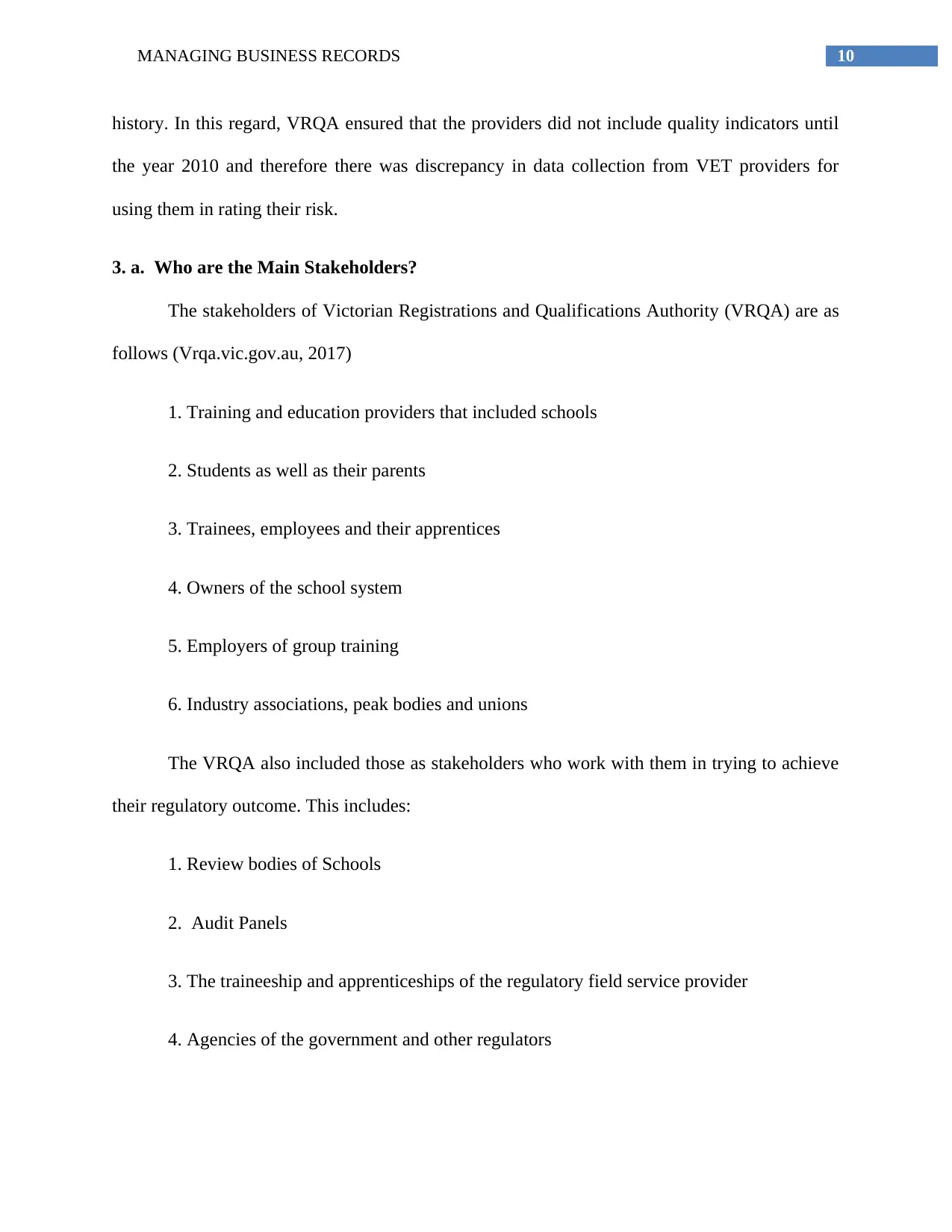
10MANAGING BUSINESS RECORDS
history. In this regard, VRQA ensured that the providers did not include quality indicators until
the year 2010 and therefore there was discrepancy in data collection from VET providers for
using them in rating their risk.
3. a. Who are the Main Stakeholders?
The stakeholders of Victorian Registrations and Qualifications Authority (VRQA) are as
follows (Vrqa.vic.gov.au, 2017)
1. Training and education providers that included schools
2. Students as well as their parents
3. Trainees, employees and their apprentices
4. Owners of the school system
5. Employers of group training
6. Industry associations, peak bodies and unions
The VRQA also included those as stakeholders who work with them in trying to achieve
their regulatory outcome. This includes:
1. Review bodies of Schools
2. Audit Panels
3. The traineeship and apprenticeships of the regulatory field service provider
4. Agencies of the government and other regulators
history. In this regard, VRQA ensured that the providers did not include quality indicators until
the year 2010 and therefore there was discrepancy in data collection from VET providers for
using them in rating their risk.
3. a. Who are the Main Stakeholders?
The stakeholders of Victorian Registrations and Qualifications Authority (VRQA) are as
follows (Vrqa.vic.gov.au, 2017)
1. Training and education providers that included schools
2. Students as well as their parents
3. Trainees, employees and their apprentices
4. Owners of the school system
5. Employers of group training
6. Industry associations, peak bodies and unions
The VRQA also included those as stakeholders who work with them in trying to achieve
their regulatory outcome. This includes:
1. Review bodies of Schools
2. Audit Panels
3. The traineeship and apprenticeships of the regulatory field service provider
4. Agencies of the government and other regulators
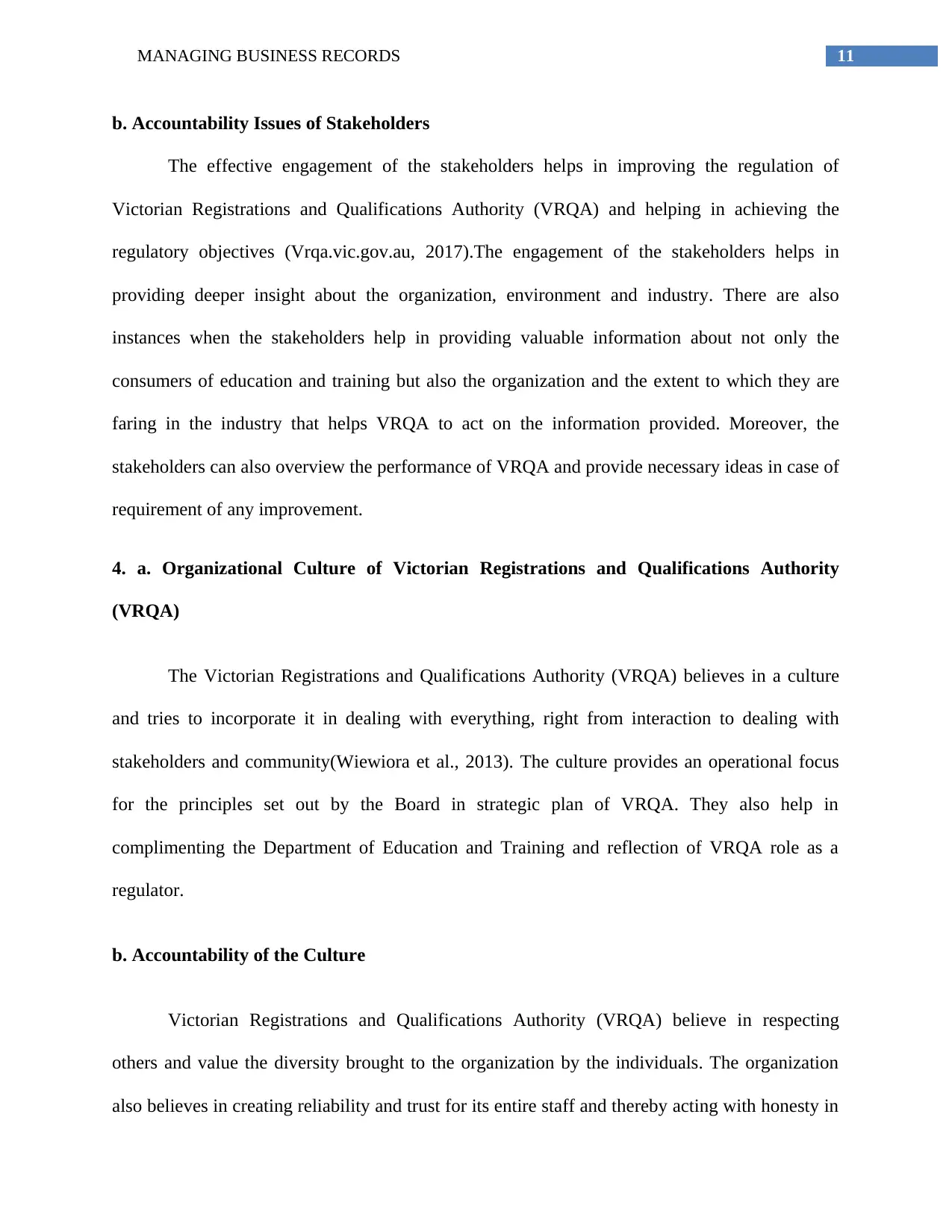
11MANAGING BUSINESS RECORDS
b. Accountability Issues of Stakeholders
The effective engagement of the stakeholders helps in improving the regulation of
Victorian Registrations and Qualifications Authority (VRQA) and helping in achieving the
regulatory objectives (Vrqa.vic.gov.au, 2017).The engagement of the stakeholders helps in
providing deeper insight about the organization, environment and industry. There are also
instances when the stakeholders help in providing valuable information about not only the
consumers of education and training but also the organization and the extent to which they are
faring in the industry that helps VRQA to act on the information provided. Moreover, the
stakeholders can also overview the performance of VRQA and provide necessary ideas in case of
requirement of any improvement.
4. a. Organizational Culture of Victorian Registrations and Qualifications Authority
(VRQA)
The Victorian Registrations and Qualifications Authority (VRQA) believes in a culture
and tries to incorporate it in dealing with everything, right from interaction to dealing with
stakeholders and community(Wiewiora et al., 2013). The culture provides an operational focus
for the principles set out by the Board in strategic plan of VRQA. They also help in
complimenting the Department of Education and Training and reflection of VRQA role as a
regulator.
b. Accountability of the Culture
Victorian Registrations and Qualifications Authority (VRQA) believe in respecting
others and value the diversity brought to the organization by the individuals. The organization
also believes in creating reliability and trust for its entire staff and thereby acting with honesty in
b. Accountability Issues of Stakeholders
The effective engagement of the stakeholders helps in improving the regulation of
Victorian Registrations and Qualifications Authority (VRQA) and helping in achieving the
regulatory objectives (Vrqa.vic.gov.au, 2017).The engagement of the stakeholders helps in
providing deeper insight about the organization, environment and industry. There are also
instances when the stakeholders help in providing valuable information about not only the
consumers of education and training but also the organization and the extent to which they are
faring in the industry that helps VRQA to act on the information provided. Moreover, the
stakeholders can also overview the performance of VRQA and provide necessary ideas in case of
requirement of any improvement.
4. a. Organizational Culture of Victorian Registrations and Qualifications Authority
(VRQA)
The Victorian Registrations and Qualifications Authority (VRQA) believes in a culture
and tries to incorporate it in dealing with everything, right from interaction to dealing with
stakeholders and community(Wiewiora et al., 2013). The culture provides an operational focus
for the principles set out by the Board in strategic plan of VRQA. They also help in
complimenting the Department of Education and Training and reflection of VRQA role as a
regulator.
b. Accountability of the Culture
Victorian Registrations and Qualifications Authority (VRQA) believe in respecting
others and value the diversity brought to the organization by the individuals. The organization
also believes in creating reliability and trust for its entire staff and thereby acting with honesty in
⊘ This is a preview!⊘
Do you want full access?
Subscribe today to unlock all pages.

Trusted by 1+ million students worldwide
1 out of 24
Related Documents
Your All-in-One AI-Powered Toolkit for Academic Success.
+13062052269
info@desklib.com
Available 24*7 on WhatsApp / Email
![[object Object]](/_next/static/media/star-bottom.7253800d.svg)
Unlock your academic potential
Copyright © 2020–2026 A2Z Services. All Rights Reserved. Developed and managed by ZUCOL.




